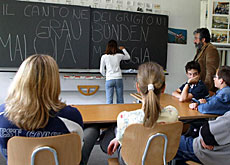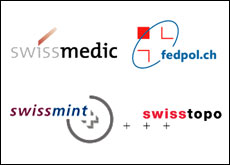Italian fights its corner in Switzerland

The teaching of Switzerland’s third national language, Italian, is under threat outside the two cantons where it is traditionally spoken.
A committee has unveiled a plan to defend Italian in areas where it is struggling to survive, beyond the borders of Ticino and Graubünden.
The Italian-speaking members of “Rencontres suisses”, an association founded in 1948 to promote national cohesion, have launched an advertising campaign to highlight the perils faced by their language.
The association says it must act before it is too late.
“We cannot keep on complaining about the situation and do nothing,” said Alessio Petralli, a language and dialect specialist.
“Italian-speaking Switzerland has not done enough to defend itself in other parts of the country,” he added. “If we don’t want to lose our identity and become a ghetto, we must take action.”
Vote
In an effort to put Italian at the top of the political agenda, the association is hoping to force a nationwide vote on the issue. The constitution would be modified to guarantee the teaching of a second national language at primary school.
It would force the federal authorities to support the teaching of a third national language and help create a national multilingual domain in the media.
By the end of the year the association hopes to start collecting the 100,000 signatures needed to force a vote.
The association’s warning comes as Italian courses are facing cutbacks at Swiss universities. In Neuchâtel, the university plans to abandon a teaching position as part of various cost-cutting measures.
Protests
On Tuesday, students, along with members of canton Neuchâtel’s Italian associations, demonstrated against the cuts. They vented their opposition to a proposal that they claimed was an attack against federalism, Swiss identity and the country’s multilingual tradition.
“Italian speakers should boycott Neuchâtel University,” said Giovanni, a law student from canton Ticino.
In Fribourg, the university has also frozen plans for a new Italian professorship, a decision the arts faculty says is purely financial. “This does not mean we are abandoning Italian as a subject for our students,” added Julio Penate, head of the Roman languages department.
But the students fear that Italian is being sold short, and say they cannot accept that financial interests have a higher priority than a well-rounded education.
Funding
Alessandro Marini, who teaches the third national language in Fribourg and Neuchâtel, says he cannot understand why Italian should be cut from university programmes.
“The number of students has been stable for years in Switzerland, and the level of our courses and research can be favourably compared with Italy’s,” he told swissinfo.
Marini, who fears the country’s next generation of Italian teachers will suffer from the cuts, is still hoping a solution can be found to maintain the professorship in Neuchâtel.
“It may be possible to find some outside funding, so we can help maintain the dignity of our courses,” he added.
swissinfo with agencies
The last national census in 2000 showed that 471,000 people spoke Italian as their first language in Switzerland, or 6.5% of the population.
The share was 7.6% in the 1990 census.
German is the first language of 4.6 million people (63.7%) in Switzerland, while French is the language of choice for 1.5 million (20.4%).

In compliance with the JTI standards
More: SWI swissinfo.ch certified by the Journalism Trust Initiative

You can find an overview of ongoing debates with our journalists here. Please join us!
If you want to start a conversation about a topic raised in this article or want to report factual errors, email us at english@swissinfo.ch.